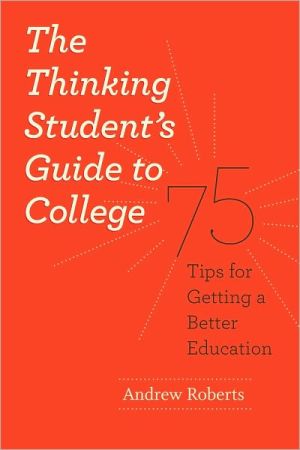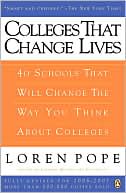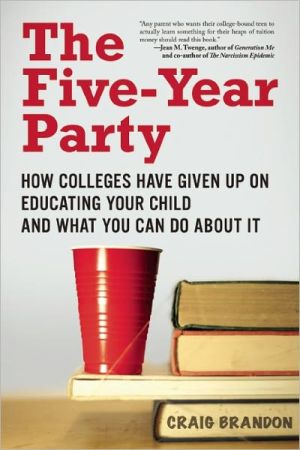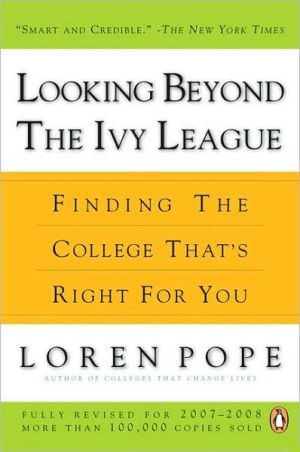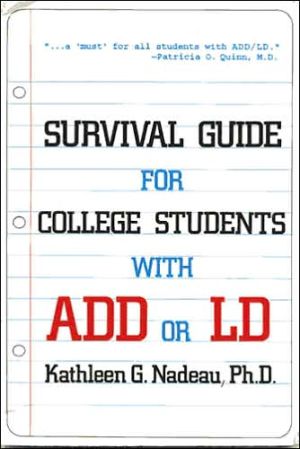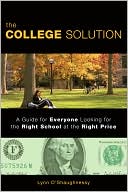The Thinking Student's Guide to College: 75 Tips for Getting a Better Education
Andrew Roberts's Thinking Student's Guide to College helps students take charge of their university experience by providing a blueprint they can follow to achieve their educational goals-whether at public or private schools, large research universities or small liberal arts colleges. An inside look penned by a professor at Northwestern University, this book offers concrete tips on choosing a college, selecting classes, deciding on a major, interacting with faculty, and applying to graduate...
Search in google:
Each fall, thousands of eager freshmen descend on college and university campuses expecting the best education imaginable: inspiring classes taught by top-ranked professors, academic advisors who will guide them to a prestigious job or graduate school, and an environment where learning flourishes outside the classroom as much as it does in lecture halls. Unfortunately, most of these freshmen soon learn that academic life is not what they imagined. Classes are taught by overworked graduate students and adjuncts rather than seasoned faculty members, undergrads receive minimal attention from advisors or administrators, and potentially valuable campus resources remain outside their grasp. Andrew Roberts’ Thinking Student’s Guide to College helps students take charge of their university experience by providing a blueprint they can follow to achieve their educational goals—whether at public or private schools, large research universities or small liberal arts colleges. An inside look penned by a professor at Northwestern University, this book offers concrete tips on choosing a college, selecting classes, deciding on a major, interacting with faculty, and applying to graduate school. Here, Roberts exposes the secrets of the ivory tower to reveal what motivates professors, where to find loopholes in university bureaucracy, and most importantly, how to get a personalized education. Based on interviews with faculty and cutting-edge educational research, The Thinking Student’s Guide to College is a necessary handbook for students striving to excel academically, creatively, and personally during their undergraduate years.
The Thinking Student's Guide to College\ 75 Tips for Getting a Better Education \ \ By Andrew Roberts \ THE UNIVERSITY OF CHICAGO PRESS\ Copyright © 2010 The University of Chicago\ All right reserved.\ ISBN: 978-0-226-72115-6 \ \ \ \ Chapter One\ How Universities Work \ Soon after arriving on campus, freshmen at my undergraduate college were treated to a lecture by an art historian entitled "A Sense of Where You Are." His talk was about the architectural evolution of the campus and the merits of its various buildings. This chapter tries to do something similar but at a more general level. It explains how modern universities and colleges work-not their physical architecture, but their internal architecture. What they are trying to do-their mission-and how they carry it out. The point of this exercise is to show you what sort of education universities have been designed to provide. The advice throughout this book will make better sense if you understand why I am offering it.\ There are over four thousand colleges and universities in the United States, ranging from for-profit, vocational schools that teach their classes online to nonprofit, liberal arts colleges in small New England villages. The description and advice to follow applies to a fraction, but a significant fraction of this group: colleges and universities that try to maintain a national reputation and have faculty who produce at least some research, though many of the factors described apply more broadly. Lest one think this is merely a guidebook to the Ivy League, the advice here should apply to most four-year residential colleges in the United States that admit only a portion of applicants. To put a number on it, the advice should easily fit what the Princeton Review calls the country's 371 best colleges and probably a few hundred more besides. The range is from Harvard to Angelo State, from Stanford to Lourdes.\ What Universities Want\ What are universities trying to do? To answer this question, you might start with their mission statements. The University of Miami's is "to educate and nurture students, to create knowledge, and to provide service to our community and beyond." But what does this mission imply? It combines teaching, research, and service, three elements present in the mission statements of the sort of colleges described in this book. But how does the university carry them out, and how are they reconciled with each other?\ One place to start understanding any organization is the bottom line: where the money comes from and where it goes. But things are not so simple with universities because most of them are nonprofits. They are not simply trying to maximize their profits like Microsoft or General Electric. Any profits they earn have to be reinvested in the university, not distributed to owners or stockholders. So, universities are not out to get rich, or more precisely only wish to get rich to pursue other aims.\ What are those other aims? The one aim that drives most colleges and universities, at least those discussed in this book, is a desire to increase their prestige. Universities wish to be viewed as the best in their line of work. They want to achieve the highest esteem among the general public and their peers that they can. To put it bluntly, everyone wants to be Harvard, and Harvard wants to make sure that no one else is Harvard.\ Prestige of course is a zero-sum game. Only one university can be the best, only ten can be in the top ten, and so on down the line. If someone moves up, then someone else has to move down. And so competition is fairly merciless.\ Now the key question is where prestige comes from. The answer may be a surprise for some readers or immediately obvious to others. Universities and colleges are not viewed as prestigious because they provide the best undergraduate education or because they do the most for their students. Harvard is not Harvard because of what takes place in its classrooms. Truth be told, the classroom experience is more or less a black box for everyone but current students, and even they are in the dark to a certain extent.\ Prestige comes, rather, from research. Universities are viewed as prestigious when they have the faculty that is most accomplished in scholarship. The most prestigious universities are the ones who employ the most Nobel Prize winners, the professors with the longest publishing records, and the scholars who are most frequently cited by their colleagues. It is excellence in research that puts Harvard, Yale, Stanford, and all the rest at the top of the heap and Podunk U at the bottom.\ The Problem with Teaching\ Why is it research excellence rather than teaching excellence that leads to prestige? Shouldn't it be the reverse? One important reason is that skill at teaching undergraduates is difficult to measure and compare. It is hard to determine who does teaching well and to what extent. Students are the main beneficiaries of good teaching, but they are not in a good position to compare universities (being as they attend only one) and are amateurs in the art of evaluation. Even university administrators find it difficult to evaluate their employees on this score since there is no gold standard of teaching, much less an objective way to measure it.\ The outcomes of learning are also hard to quantify. There is no test administered to all graduating seniors to determine which universities did the best job educating their students. Career success is one standard, but it has its problems. Are Harvard graduates more successful because they learned more at Harvard or because Harvard was able to recruit the most talented students? As we shall see in the next chapter, it is mainly the latter.\ Teaching quality is also less visible to the world at large. Professors, for example, have little idea who among their peers are the best teachers because they don't attend each others' classes or interact with students from other universities. And if professors who work day in and day out at the university don't know this, how are those outside the university supposed to find out? Because the benefits of teaching are felt locally, not globally, it is hard for them to increase a college's prestige. Prestige has to come from a factor that is visible beyond the university campus.\ The Importance of Research\ Now consider research, the task of coming up with new theories of how the world works. Excellence in research is easy to measure. Not only are there awards (the Nobel Prizes and their equivalents in each and every field), but there are publication records (numbers of books and journal articles), citation counts (how many times scholars are cited by others), and even confidential peer evaluations. These measures moreover are made by sophisticated experts rather than naive undergraduates. Most of us in a given field agree who the stars are and who the duds and which universities have more in each category.\ Research similarly has a global reach. It is as visible across oceans and continents as it is on a single university campus. A scholar in London or Tokyo can easily pick up the latest article or monograph by a scholar from Omaha and judge for him- or herself its worth. And because all scholarship is produced by a community of scholars who read each other's work and build on what has gone before, they try to stay current on what is happening in their field.\ Even the world at large values research over teaching. Consider who gets more respect in our society: the discoverers of new species, elementary particles, and medicines, or the teachers who get the most of their students? Whether you measure prestige by salaries, media attention, or simply pure admiration, research usually beats teaching. For all of these reasons, the prestige built on research is far more bankable than that built on teaching.\ How to Win the Prestige Game\ So, for a university to become more prestigious-which is what its administrators, board, alumni, and probably even students want-it needs to hire scholars who are productive researchers. This may mean cherry-picking established scholars from other schools or trying to identify the bright young scholars from among newly minted PhDs.\ How can schools attract these academic superstars (yes, that is what we call them)? Higher salaries help, but that is not what particularly motivates most professors. If they cared mainly about money, they would have chosen another profession. Instead, professors also play the prestige game. They want to be esteemed in their field and, as in the university prestige game, research matters and for most of the same reasons. To win prestige they need to be turning out new articles and books as fast as they can.\ To do this they need time to devote to research. Thus, when a university wishes to hire a superstar or potential superstar, the professor in question will negotiate to get more time to do her research, time that she can dispose of as she sees fit (otherwise known as discretionary time). This time almost always comes at the expense of teaching. After all, professors' main tasks are teaching and research. Professors with good publishing records bargain for reduced teaching loads so that they can devote more time to research.\ Since universities are competing with each other for the best scholars, they offer more discretionary time to the ones who are the most productive. If universities tried to force these productive scholars to spend more energy on teaching, they would lose them to other universities who would be glad to let Nobel Prize winners do whatever they want as long as they wear the university colors on graduation day. If you want to know why the famous professors at your university don't show up in the classroom very much, this is the answer.\ Incentives and Teaching\ It is not just discretionary time-which simply pulls professors out of the classroom-that matters for teaching quality. Having hired talented researchers, universities need to make sure that they have incentives to do as much high quality research as they can. For this reason, most of the rewards a professor can receive are for research success. Professors gain little-not salary, free time, or promotion-by becoming better teachers. They gain all of these things by becoming better researchers. Indeed, this incentive system was devised precisely in order to encourage more and better research and increase a university's prestige. If a professor has to decide where to allocate a free hour during the day, a simple cost-benefit analysis tells him or her that it should be spent on research rather than teaching.\ Research is not the only thing that skews attention away from the classroom. A surprising fact is that most professors produce relatively little original research. The difficulties in measuring and evaluating teaching make it hard for universities to reward professors for better teaching even if they wanted to. Professors may be sanctioned for ignoring their classes, but it is difficult to identify and encourage exceptional effort. Developing an innovative course and spending extra time with students aren't easily monitored aspects of a professor's career.\ At the same time, professors are not trained in the arts of teaching and tend to be suspicious of pedagogy. They earned their PhDs in specific disciplines like anthropology or physics, not in teaching anthropology or teaching physics. One survey found that only 8 percent of professors have taken advantage of research on teaching methods. Most professors are interested in the subject matter of their classes more than the best ways to teach it and so they do not actively pursue better ways of teaching. This would after all require extra effort for which they would not reap rewards. How many employees in any industry go the extra mile out of the goodness of their hearts?\ The Undergraduate Connection\ But where do undergraduates fit into the picture? After all, undergraduate dollars-first as tuition, later as alumni donations-fund most of this scheme. Why don't students choose universities that focus more energy on undergraduates and provide higher quality teaching? Why isn't the customer king as he is in restaurants, supermarkets, and clothing stores?\ In the first place, it is hard for students to assess teaching quality, particularly at the level of an entire university. This is due to all the informational difficulties I mentioned earlier. Potential students and even rating agencies like U.S. News are not well placed to evaluate which schools provide the best education, partially because a great education is so intangible. Students therefore choose their universities based on clear variables like prestige rather than fuzzy ones like teaching quality.\ It is not even clear that students are looking for teaching excellence. The demand for a great education is not as strong as you might think. Undergraduates are as hungry for prestige as everyone else. Even if Harvard professors completely ignored undergraduates but were the smartest guys in the world, they would still attract students. Many students do not see university primarily as a place to get the best possible education, but as a place to get a valuable credential (their diploma) that can be converted into a high-paying job. The credential is obviously worth more if it comes from a university considered prestigious.\ Other students don't demand a better educational experience because they consider college mainly a nice place to while away four years before they start work, hence all of the money spent by universities on amenities like catered food, manicured lawns, luxurious (or at least fairly nice) dormitories, and entertaining sports teams. In many ways, universities have come to resemble country clubs complete with the requisite price tag. So long as life is pleasant outside the classroom and not too demanding inside, many students are content.\ As far as education goes, universities only have to satisfy the minority of students who care about a great education. They thus put in place institutions that can be accessed by a few ambitious students but pass unnoticed by others. These institutions are not always highlighted because they would become prohibitively expensive if all students took advantage of them. One of the main aims of this book is to introduce you to these options.\ Alumni, whose support and donations help the university to survive, generally share the desire of university administrators to maximize the university's prestige. How does great teaching help them? Their academic careers are long behind them. Greater prestige, by contrast, raises the value of their diploma as they become associated with a more prestigious brand. Alumni are also in a poor position to monitor the quality of an undergraduate education even if they wanted to; like everyone else, they have to rely on externally visible variables like research productivity, Nobel Prizes, and U.S. News rankings. If you want to see how universities try to impress their alumni, take a look at the opulent festivities during reunion weekend.\ Cause for Hope\ While this assessment may seem excessively gloomy, there is hope. Universities have actually been getting better over time at both research and teaching. It was once the case that universities did not compete for students; graduates of Andover and other prep schools went to the Ivy League universities, while everyone else went to their local public university. And in the not too distant past, students did not demand that professors devote time and effort to their education. Many were content to listen passively to a distinguished lecturer and take their gentlemen's C. College was more a finishing school than a place of learning.\ Today this is no longer the case. Universities compete hard for the best students, and students demand more faculty involvement. This has led universities to emphasize classroom teaching more than they once did. Popular criticism of an out-of-touch professoriate has had the same effect. A number of recent books decrying the decline of undergraduate teaching have embarrassed universities and led them to put more resources into their educational mission. Because so much of their funding comes directly or indirectly from the government, universities are keen to remain in the good graces of politicians. This means, among other things, maintaining a pristine public image.\ The upshot, as former Harvard president Derek Bok puts it, is that "colleges launched a variety of experiments to provide more individualized instruction, at least for portions of the student body. Honors programs were established for qualified students. Research internships offered opportunities for undergraduates to work in laboratories alongside experienced investigators. Freshman seminars, group tutorials, and small senior colloquia afforded students at least a modicum of personal contact with faculty members."\ Evidence that something has changed can be found in a recent survey of college graduates that asked whether they had received special attention from faculty members during their college career. Graduates from the late eighties were far more likely to report that they had received special attention than those who graduated in the mid-seventies or mid-fifties. The trend is toward better teaching and more personal attention, especially for those who seek it out.\ (Continues...)\ \ \ \ \ Excerpted from The Thinking Student's Guide to College by Andrew Roberts Copyright © 2010 by The University of Chicago. Excerpted by permission.\ All rights reserved. No part of this excerpt may be reproduced or reprinted without permission in writing from the publisher.\ Excerpts are provided by Dial-A-Book Inc. solely for the personal use of visitors to this web site. \ \
Introduction 1Text Box: The Purposes of a College Education 61 How Universities Work 8Text Box: The History of the University 12Text Box: A Student's Guide to College Administration 172 Choosing a College 22Tip 1 You Can Get an Equivalent Classroom Education at Most Reasonably Selective Colleges and Universities 23Text Box: Nobel Prize Winners 25Tip 2 The Key Distinction is between Small Colleges and Large Universities 26Text Box: Where do Professors send their Children to College? 30Tip 3 Reputation Doesn't Matter as Much as you Think 31Tip 4 The Main Importance of Reputation is the Student Body it Attracts 33Text Box: U.S. News Ratings 34Text Box: Minorities and College Choice 36Tip 5 Look for Signs of a Personalized Education 36Tip 6 Consider the Cost 37Tip 7 Differences in the Strength of Particular Departments are Not Usually a Good Basis for Choosing among Colleges 39Text Box: Choosing a Foreign University 41Tip 8 Consider the Different Varieties of General Education Programs 41Tip 9 Don't Worry; Most Students are Happy with Their Choice 433 Choosing Classes 45Tip 10 Consider Visiting Multiple Classes during the First Week of the Semester 46Tip 11 Usually Trust Your First Impressions 47Text Box: Priorities in Choosing Classes 48Tip 12 Go for Variety, Especially Early On 49Tip 13 At Least Once a Year Pick a Class That Doesn't Seem to Fit Your Interests 50Tip 14 Take Classes with Heavy Writing Requirements 51Tip 15 Take as Many Small Seminars and as Few Large Lecture Courses as Possible 53Text Box: What does a Good Lecture Look Like? 56Tip 16 Take Mostly Upper-Division Courses 57Tip 17 Focus More on Methods than Topics 58Tip 18 Seek out Classes that Provide you with Continuous Feedback and Take the Feedback Seriously 59Tip 19 Know the Status of your Professors 60Tip 20 Learn to be a Critical Reader of Student Evaluations of Faculty 63Tip 21 Ask Professors you Know What Courses they would Recommend 65Tip 22 Take Courses that Relate to Each Other 66Tip 23 Study Abroad for at Least One Semester if Not an Entire Year 67Tip 24 Don't Succumb to the "Two Cultures" 68Tip 25 Don't Try to Get All of Your General Education Requirements out of the Way in Freshman and Sophomore Year 70Tip 26 Audit Classes that you Don't Have Time to Take 71Tip 27 Consider Independent Study Classes 72Tip 28 Don't Take Too Many Classes with One Professor 73Tip 29 Don't be Afraid to Exceed Requirements 73Tip 30 Unless you Plan to Major in Chemistry or Biology, Leave Medical School Requirements until Later 74Tip 31 Either Take Foreign Language Classes Seriously or Try to Place Out of Them 75Tip 32 Be Discerning in Choosing Internships for Credit 76Tip 33 Take Prerequisites with a Grain of Salt 77Tip 34 Consider Graduate Courses 774 Choosing a Major 78Tip 35 Sample a Lot of Different Departments 79Tip 36 Choose a Major That you Love 80Text Box: Some Neglected Majors 81Tip 37 Find out what you are Good at 83Tip 38 Don't Worry too Much about the Job Prospects of the Major 85Tip 39 Choose Smaller Majors 86Tip 40 Choose More Structured Majors 87Text Box: Women and the Sciences 88Tip 41 Go to an Academic Lecture Given in the Department 89Tip 42 Be Skeptical about Double or Triple Majoring 90Tip 43 Write a Senior Thesis 91Tip 44 Don't Get Too Stressed out over your Choice 935 Being Successful 95Tip 45 Manage your Time 95Tip 46 Show Professors that you are Working Hard 96Tip 47 Join a Small Study Group 97Text Box: What Grades Mean 97Tip 48 Ask for Help 99Tip 49 Don't Let your Instructors Suspect that you are Taking Advantage of Them 99Text Box: Grade Inflation 100Tip 50 Learn the Rules of Critical Thinking and Apply them Constantly 102Tip 51 Professorial Shortcuts for Writing 106Tip 52 Professorial Shortcuts for Doing Research 108Text Box: Self-Care 1106 Interacting with Professors 112Tip 53 Be Respectful 112Tip 54 Be Curious about the Subject 113Text Box: Interacting with Female Professors 114Tip 55 Visit all your Professors during Office Hours at Least Once 115Tip 56 Get to Know at Least One Professor Well 116Tip 57 Find out what your Professors Research 117Text Box: "Tenured Radicals" 118Tip 58 Send E-mails Judiciously, Answer E-mails Promptly 119Text Box: Writing an Effective E-Mail 120Tip 59 Avoid Complaints about Grades 121Tip 60 Become a Research Assistant 123Tip 61 Ask for Recommendation Letters from Professors who know you well 1247 Learning Outside the Classroom 127Tip 62 Get Involved in Extracurricular Activities 127Tip 63 Subscribe to an Intellectual Magazine 128Tip 64 Read Academic Blogs 129Text Box: Academic Blogs 131Tip 65 Attend a Public Lecture Every Week 132Tip 66 Spend Your Free Time in Coffeehouses 133Tip 67 Make Friends with People who have Different Beliefs and Experiences 134Tip 68 Get to Know Foreign Students 1368 Going to Graduate School 138Tip 69 There Seldom are Strong Reasons to Go to Graduate School Immediately after College 138Tip 70 Learn More about the Career Graduate School is Leading to 140Tip 71 Graduate School is not Just Advanced Undergrad 141Text Box: Getting Fellowships 142Tip 72 Ask your Professors' Advice about PhD Programs in Their Field 143Tip 73 PhD Programs are not for Training Teachers 144Text Box: Types of Graduate Programs 145Tip 74 Prestige Does Matter for PhD Programs 146Tip 75 Talk to Current Grad Students 1479 Secrets of the Guild: Rules Professors Live by 149Rule A Reduce Thy Teaching Load 149Text Box: The Campus Novel 151Rule B Publish or Perish 153Rule C Pamper Grad Students 155Rule D Limit the Effort you Devote to Undergraduates 156Text Box: How to Improve your Professors 159Rule E Play the Market 160Acknowledgments 163Recommended Reading 165Index 167
\ U.S. News and World ReportI want to nominate a book for this summer's college reading lists that I think represents the best possible selection: The Thinking Student’s Guide to College: 75 Tips for Getting a Better Education. Andrew Roberts, an assistant professor of political science at Northwestern University, wrote this great book that can help students squeeze far more value out of their college years than any other book that I've read.”\ — Lynne O'Shaughnessy\ \ \ \ \ \ Crooked Timber“In fact I don’t currently have a copy of the book, because each copy I get goes to the next high school senior who walks through the door (which an alarming number of them seem to be doing these days). As suggested by this, 75 Tips would be a great Christmas present for the college-bound high school seniors and college freshmen of your acquaintance.”\ \ \ Michael Koppisch“Andrew Roberts has a light touch, gives students excellent advice, and writes in a direct, engaging style. What I find particularly interesting is the perspective from which he counsels students, that of a serious academic who seems fully dedicated to his profession despite what he sees as its flaws and who knows his way around a university. A student who took his tips to heart could hardly go wrong, for Professor Roberts’ advice is based on good, solid academic values.”\ \ \ \ \ Michael McPherson“The Thinking Student’s Guide to College addresses a neglected topic with force and persuasiveness. This valuable book, aimed at high achieving students at selective universities who want to get a quality education, offers genuinely practical advice. By addressing students directly, drawing on his experience and observations in academic life, Andrew Roberts provides an accessible and credible account of how to make college a valuable experience educationally.”\ \ \ \ \ Harry Brighouse"Every selective college offers a high quality academic experience to the student who knows how to get it, but none give you a map, let alone instructions. Andrew Roberts has written the perfect travel guide to the best things on offer: an undergraduate who took just a third of his advice would double the value of her time in college. Every prospective freshman should read this book, and every parent of a prospective freshman has to read it. Easy and fun to read, with pages of advice."\ \ \ \ \ U.S. News and World Report\ - Lynne O'Shaughnessy\ “I want to nominate a book for this summer's college reading lists that I think represents the best possible selection: The Thinking Student’s Guide to College: 75 Tips for Getting a Better Education. Andrew Roberts, an assistant professor of political science at Northwestern University, wrote this great book that can help students squeeze far more value out of their college years than any other book that I've read.”\ \
